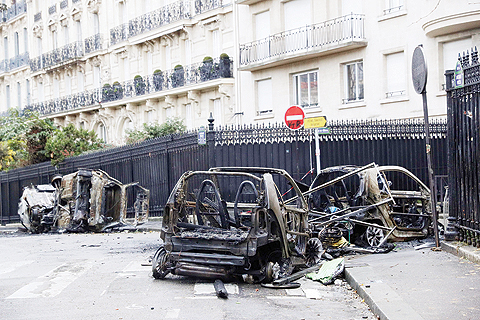Macron under fire as 'yellow vest' protesters fume
 PARIS: A picture shows burned cars in a street of Paris after clashes during a protest of Yellow vests (Gilets jaunes) against rising oil prices and living costs. _ AFP
PARIS: A picture shows burned cars in a street of Paris after clashes during a protest of Yellow vests (Gilets jaunes) against rising oil prices and living costs. _ AFPPARIS: The French government signaled yesterday that it was prepared to make further concessions to "yellow vest" protesters, even raising a possible rollback on a controversial move to cut taxes for high earners last year. President Emmanuel Macron faces a crucial few days as he seeks an end to more than two weeks of protests which degenerated on Saturday into some of the worst violence in central Paris in decades. The former investment banker was heckled by a crowd as he visited a burned out government building in Puy-en-Velay in central France on Tuesday night, just hours after a new opinion poll showed his approval rating at just 23 percent.
The so-called "yellow vest" protests began on November 17 in opposition to rising fuel taxes, but they have since ballooned into a broad challenge to Macron's pro-business agenda. One of the frequent demands from the protesters, who are mostly from rural or small-town France, is a repeal of Macron's move last year to cut the ISF "fortune tax" which was previously levied on high-earners. "If something isn't working, we're not dumb, we'll change it," government spokesman Benjamin Griveaux said on RTL radio yesterday morning, saying the wealth tax would be evaluated between now and late next year.
Macron, 40, made the issue one of his key campaign pledges ahead of his election in May 2017, arguing that punitive taxes on the wealthy discouraged job creation and led many entrepreneurs to leave France. Griveaux stressed that re-instating the ISF "is not on the table for now," but Equality Minister Marlene Schiappa said she would argue to bring it back unless the tax cut could be shown to be effective. "The government has been too technocratic and took too long to respond" to the protests, she told France 3 television Tuesday in a withering assessment of the management of the current political crisis.
U-turn on taxes
On Tuesday, Prime Minister Edouard Philippe announced the first major U-turn of Macron's presidency when he suspended for six months a rise in fuel taxes scheduled for January 1. Griveaux stressed that the tax hikes could be scrapped permanently if no agreement was reached during consultations over the next six months. "We're not in politics to be right. We're in politics so that things work out," he said. A source in the prime minister's office also told AFP that "the government has not necessarily played all of its cards", with further concessions such as a further cut in residence taxes possible. Many "yellow vest" protesters, named after the high-visibility jackets they wear, have said that Philippe's rollback on fuel taxes is not enough and have called for new protests in the capital on Saturday.
Two truck driver unions have also called an indefinite sympathy strike to begin Sunday night, and the protests have spread to dozens of schools nationwide as students denounce tougher university entrance requirements. Farmers will also consider whether to mount a day of demonstrations and possibly road blockades next week, the head of the FNSEA agricultural union said. Barricades at fuel depots are also causing shortages in some areas of France, while Paris businesses are bracing for new clashes which could erupt between protesters and police on Saturday.
More violence?
Interior Minister Christophe Castaner on Tuesday urged "responsible" protesters not to come to the capital after crowds ran amok last Saturday, burning more than 200 cars, vandalizing shops and leaving the Arc de Triomphe daubed in graffiti. Opposition leaders, including Laurent Wauquiez of the rightwing Republicans, have called on the government to impose a state of emergency and to deploy army units to back up police.
Amid his domestic woes, Macron also saw his "friend" US President Donald Trump weigh in on Twitter, saying protesters were disavowing Macron's adherence to the 2015 Paris climate accord. "The Paris Agreement is fatally flawed because it raises the price of energy for responsible countries while whitewashing some of the worst polluters... in the world," Trump wrote. Trump also retweeted a false claim from American conservative student activist Charlie Kirk that said: "'We want Trump' being chanted through the streets of Paris." Macron's office said it had "no comment" on Trump's tweets.- AFP










